高二-虚拟语气用法讲解(ppt)
合集下载
虚拟语气讲解课件ppt.ppt

虚拟语气
虚拟语气在:在宾语从句中
[例句]
1. I wish she would be on my side. 我希望她能站在我一边。
2. I wish I were 10 years younger. 我但愿自己能年轻十岁。
3. I wish (that) you would get a good job. 我希望你能找到一个好职业。
• He insisted that he was right. 他坚称他是正确的。
认识到了贫困户贫困的根本原因,才 能开始 对症下 药,然 后药到 病除。 近年来 国家对 扶贫工 作高度 重视, 已经展 开了“ 精准扶 贫”项 目
虚拟语气
虚拟语气在:在宾语从句中
• 在would (had) rather(宁愿) 引导的宾语从句中
[例句] • It’s necessary that we should have a walk now.
我们有必要出去散散步。
• It’s natural that she should do so. 她这样做是很自然的。
1. It’s important that we should take good care of the patient. 重要的是我们要照顾好病人。
一、在条件从句中 (叫虚拟条件句),表示与事实相反 的条件。分三种情况(以 do 为例):
认识到了贫困户贫困的根本原因,才 能开始 对症下 药,然 后药到 病除。 近年来 国家对 扶贫工 作高度 重视, 已经展 开了“ 精准扶 贫”项 目
虚拟语气
虚拟语气在 在条件从句中
[例句]
• If you had come a few minutes earlier, you would have met him.
高中英语-虚拟语气精讲(超全整理篇)ppt课件

The teacher asked (that) our homework __(_sh__o_u_ld_)__b_e_f_in_i_s_h最_e新_d版整_理i_pnp_t t_i_m_e_________ . 29
这些动词相对应的名词性从句也用should do
It is ord(e一r)e.d主/语c从o句mmanded /
should/would/could/mig ht + do
最新版整理ppt
7
1) If he has time,he will go shopping tonight.
与事实相反!
2) If I had time,I would visit you.
最新版整理ppt
8
与过去事实相反
虚拟条件句
主句
最新版整理ppt
♥பைடு நூலகம்27
1“坚持” insist
2“命令” order, command
3“建议” advise, suggest, propose, recommend
4“要求” ask, demand, require, request, desire
+ (that) sb (should) do ... 或是 (that) sb / sth (should) be done
3. were to do 最新版整理ppt
15
If虚拟句的省略和倒装
最新版整理ppt
16
如果条件状语中有were, had, should时, 可以省略 if倒装成:Were / Should / Had +主+其他
如If果I w我er是e 你yo,u, 我I w会ou再ld试try一it次ag。ain.
这些动词相对应的名词性从句也用should do
It is ord(e一r)e.d主/语c从o句mmanded /
should/would/could/mig ht + do
最新版整理ppt
7
1) If he has time,he will go shopping tonight.
与事实相反!
2) If I had time,I would visit you.
最新版整理ppt
8
与过去事实相反
虚拟条件句
主句
最新版整理ppt
♥பைடு நூலகம்27
1“坚持” insist
2“命令” order, command
3“建议” advise, suggest, propose, recommend
4“要求” ask, demand, require, request, desire
+ (that) sb (should) do ... 或是 (that) sb / sth (should) be done
3. were to do 最新版整理ppt
15
If虚拟句的省略和倒装
最新版整理ppt
16
如果条件状语中有were, had, should时, 可以省略 if倒装成:Were / Should / Had +主+其他
如If果I w我er是e 你yo,u, 我I w会ou再ld试try一it次ag。ain.
高中英语高考高考英语语法总复习课件:虚拟语气 (共82张PPT)

【例11】 When a pencil is parted in a glass of water, it looks as if it _____(break)_. 【例12】 Eliza remembers everything exactly as if it ______ (happen)yesterday.
主句 would/should/could/might
If he didn’t come tomorrow, we would put off the meeting.
主过将从过, 主过将完从过完 would do/did would have done/had done
【例1】 If we ______ (take)the other road, we might have arrived here in time for the meeting.
【例13】 Look at the terrible situation I am in! If only I ______ (follow)your advice. 知识扩展:follow/take sb's advice
【例13】 Look at the terrible situation I am in! If only I had followed (follow)your advice. 知识扩展:follow/take sb's advice
做题时注意:动词的形式根据它所表示的时间作出相应的调整
一分为二,先找时间再判断时态。
【例4】
If we ______ (book)a table earlier, we couldn’t be standing here in a queue.
虚拟语气公开课全PPT课件(模板)

表示与现在事实相反的情况,从 句用一般过去时,主句用 “would/should/could/might + 动词原形”
80%
例句
If I were you, I would study harder.(如果我是你,我会ቤተ መጻሕፍቲ ባይዱ努 力学习。)
过去时条件句虚拟语气
基本结构
If + 主语 + had + 过去分词, 主语 + would/should/could/might + have + 过去分词
03
情态动词的疑问句形 式错误
在构成疑问句时,应将情态动词放在 句首,而不是将助动词“do”放在句 首。例如,“你能来吗?”应表达为 “Can you come?”,而不是“Do you can come?”。
THANK YOU
感谢聆听
虚拟语气在从句中的运用技巧
名词性从句中虚拟语气使用规则
虚拟语气在主语从句中的应用
当主语从句表达的是与现在事实相反的情况时,谓语动词用一般过去时。
虚拟语气在宾语从句中的应用
当宾语从句表达的是与现在事实相反的情况时,谓语动词用一般过去时或过去完成时。
虚拟语气在表语从句和同位语从句中的应用
当这些从句表达的是与现在事实相反的情况时,谓语动词用一般过去时。
定语从句中虚拟语气使用规则
虚拟语气在定语从句中的应用:当定语从句表达的是与现在事实 相反的情况时,谓语动词用一般过去时或过去完成时。
需要注意的是,定语从句中的虚拟语气通常出现在“as if”或 “as though”引导的从句中。
状语从句中虚拟语气使用规则
虚拟语气在条件状语从句中的应用
当条件状语从句表达的是与现在事实相反的情况时,谓语动词用一般过去时或过去完成 时。
80%
例句
If I were you, I would study harder.(如果我是你,我会ቤተ መጻሕፍቲ ባይዱ努 力学习。)
过去时条件句虚拟语气
基本结构
If + 主语 + had + 过去分词, 主语 + would/should/could/might + have + 过去分词
03
情态动词的疑问句形 式错误
在构成疑问句时,应将情态动词放在 句首,而不是将助动词“do”放在句 首。例如,“你能来吗?”应表达为 “Can you come?”,而不是“Do you can come?”。
THANK YOU
感谢聆听
虚拟语气在从句中的运用技巧
名词性从句中虚拟语气使用规则
虚拟语气在主语从句中的应用
当主语从句表达的是与现在事实相反的情况时,谓语动词用一般过去时。
虚拟语气在宾语从句中的应用
当宾语从句表达的是与现在事实相反的情况时,谓语动词用一般过去时或过去完成时。
虚拟语气在表语从句和同位语从句中的应用
当这些从句表达的是与现在事实相反的情况时,谓语动词用一般过去时。
定语从句中虚拟语气使用规则
虚拟语气在定语从句中的应用:当定语从句表达的是与现在事实 相反的情况时,谓语动词用一般过去时或过去完成时。
需要注意的是,定语从句中的虚拟语气通常出现在“as if”或 “as though”引导的从句中。
状语从句中虚拟语气使用规则
虚拟语气在条件状语从句中的应用
当条件状语从句表达的是与现在事实相反的情况时,谓语动词用一般过去时或过去完成 时。
英语语法专题:虚拟语气课件(20张ppt)

背景知识:
语气:谓语动词的一种形式,表示说话人的态度和意图.
分类:陈述语气(现实,符合事实)
祈使语气(说话人的建议,请求,命令,邀请)
虚拟语气(动作或状态不是事实,或者是不可能发生的情况,
而是说话人的一种愿望,建议,命令,假设或推测)
e.g. I am a student, so I study hard. 陈述
注2:错综时间条件句
如果虚拟条件主句和从句的动作发生的时间不一致,主句和从句的
谓语动词要根据各自所指的不同时间选择适当的动词形式, 如:
If I were you, I would not have missed the film last
night.
(现在----过去)
If they had started in the early morning, they would arrive in half
“If I could… ,I would…. ” or
“If I were …,I would….”
二. 虚拟语气在名词性从句中的用法 (主,宾,表,同位)
1.宾语从句 a. wish+宾语从句,表示很难实现的愿望
现在 过去 将来
过去式(be动词用were)
过去完成时,或could/would +have done could/would +动词原形
A. was worried
B. should be worried.
4. The teacher insisted Tom ______ to Lily, but Tom insisted
3. If you had come yesterday, you would have met him.
语气:谓语动词的一种形式,表示说话人的态度和意图.
分类:陈述语气(现实,符合事实)
祈使语气(说话人的建议,请求,命令,邀请)
虚拟语气(动作或状态不是事实,或者是不可能发生的情况,
而是说话人的一种愿望,建议,命令,假设或推测)
e.g. I am a student, so I study hard. 陈述
注2:错综时间条件句
如果虚拟条件主句和从句的动作发生的时间不一致,主句和从句的
谓语动词要根据各自所指的不同时间选择适当的动词形式, 如:
If I were you, I would not have missed the film last
night.
(现在----过去)
If they had started in the early morning, they would arrive in half
“If I could… ,I would…. ” or
“If I were …,I would….”
二. 虚拟语气在名词性从句中的用法 (主,宾,表,同位)
1.宾语从句 a. wish+宾语从句,表示很难实现的愿望
现在 过去 将来
过去式(be动词用were)
过去完成时,或could/would +have done could/would +动词原形
A. was worried
B. should be worried.
4. The teacher insisted Tom ______ to Lily, but Tom insisted
3. If you had come yesterday, you would have met him.
高中英语语法讲解——虚拟语气(共49张PPT)
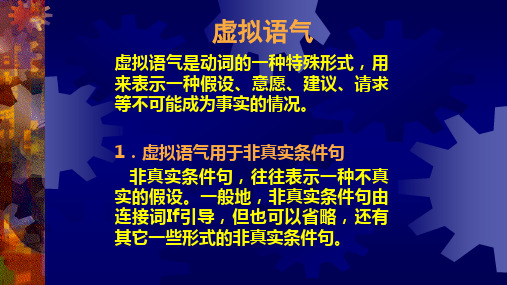
ቤተ መጻሕፍቲ ባይዱ
与现在 从 句 did,were, V-ed 事实相反 主 句 would(should,could,might)+v.
与过去 事实相反
从 句 had+V-ed/been 主 句 would(should,could, might)
+ have+v-ed
对未来的 从 句 were to/should+ v 虚拟推测 主 句 would(should,could,might)+v.
--I don’t think he should have done the favor for you. 我觉得他是不会帮你忙的。
1.3. 虚拟语气用于主语从句
1.3.1.
句型
1.表达虚拟语气的主语从句的一般形式为:
It is/was +引起虚拟语气的形容词或过去分 词+含虚拟语气的主语从句
但愿你没有那样说。
2.如果表示对将来的愿望,从句谓语动词 用 “would (could, might )+动词原形” 的形式。
--I wish you would do the favor for me. 但愿你会帮我这个忙。
--I wish I could speak several languages. 但愿我会说好几种语言。
1.2.虚拟语气用于宾语从句
1.2.1.句型“…wish that…”
在wish后的that宾语从句中: 1.如果表示对现在的愿望,从句谓语要使用过去
时: (1)从句谓语动词如果是be,则用were形式。 (2)从句谓语动词如果是行为动词,则用过去
时形式。 --I wish I were a bird. 但愿我是只鸟儿。 --I wish you didn’t talk like that.
与现在 从 句 did,were, V-ed 事实相反 主 句 would(should,could,might)+v.
与过去 事实相反
从 句 had+V-ed/been 主 句 would(should,could, might)
+ have+v-ed
对未来的 从 句 were to/should+ v 虚拟推测 主 句 would(should,could,might)+v.
--I don’t think he should have done the favor for you. 我觉得他是不会帮你忙的。
1.3. 虚拟语气用于主语从句
1.3.1.
句型
1.表达虚拟语气的主语从句的一般形式为:
It is/was +引起虚拟语气的形容词或过去分 词+含虚拟语气的主语从句
但愿你没有那样说。
2.如果表示对将来的愿望,从句谓语动词 用 “would (could, might )+动词原形” 的形式。
--I wish you would do the favor for me. 但愿你会帮我这个忙。
--I wish I could speak several languages. 但愿我会说好几种语言。
1.2.虚拟语气用于宾语从句
1.2.1.句型“…wish that…”
在wish后的that宾语从句中: 1.如果表示对现在的愿望,从句谓语要使用过去
时: (1)从句谓语动词如果是be,则用were形式。 (2)从句谓语动词如果是行为动词,则用过去
时形式。 --I wish I were a bird. 但愿我是只鸟儿。 --I wish you didn’t talk like that.
虚拟语气PPT课件

与过去事实相反
使用“if”引导从句,动词用“had+过 去分词”。例如:“If I had known the answer, I would have told you.”
表示祝愿、假设、想象等含义
表示祝愿
使用动词原形。例如:“May you have a wonderful day!”
表示假设
在条件状语从句中的用法
使用“if”引导从句,根据时态需要使用相应的动词形式。例 如:“If you study hard, you will pass the exam.”
在主句中的用法
根据时态需要使用相应的动词形式。例如:“If you studied hard, you would pass the exam.”
使用“if”引导从句,动词用过 去时态。例如:“If there were no gravity, we would float in
the air.”
表示想象
使用动词的过去时态或 “would+动词原形”。例如: “I imagined that I was flying
a kite.”
在条件状语从句和主句中的用法
主句谓语动词形式
主语+should/would/might/could+动词原形。
虚拟过去将来时
从句谓语动词形式
If+主语+had+过去分词。
主句谓语动词形式
主语+should/would/might/could+have+过去分词。
03 虚拟语气的用法
表示与事实相反的情况
与现在事实相反
与将来事实相反
主句谓语动词形式
主语+should/would/might/could+动词原形。
虚拟语气大全PPT

05
虚拟语气的常见错误
时态错误
总结词
时态错误是虚拟语气中常见的错误之 一,主要表现在时态与虚拟场景不匹 配。
详细描述
在虚拟语气中,时态应与虚拟场景相 符合。例如,在表示与现在事实相反 的虚拟场景时,应使用一般过去时, 而不是一般现在时。
语气词错误
要点一
总结词
语气词错误是指在使用虚拟语气时,语气词的选择不正确 。
虚拟语气在省略句中的用法
虚拟语气在if省略句中的用法
在if省略句中,如果条件状语从句中有were、had、should等词,可以省略if,并把were、had、should等词放 在句首。
虚拟语气在倒装句中的用法
在虚拟语气中,有时需要将谓语动词提前构成倒装句,以强调语气。例如,Were it not for your help, I would not have succeeded.
答案及解析
had read
解析
此题考查虚拟语气中的“if only”结构,表示“要是…… 就好了”。根据句意,应该使用过去完成时表示与过去事 实相反的情况。因此,答案为“had read”。
翻译题练习
翻译题1
如果我是你,我就会去参加那个 聚会。
答案及解析
If I were you, I would go to the party.
06
虚拟语气练习题及解析
选择题练习
选择题1
If it were not for the fact that I _______ busy, I would go with you.
答案及解析
A. am B. were C. will be D. have been
解析
虚拟语气详细讲解ppt课件.ppt
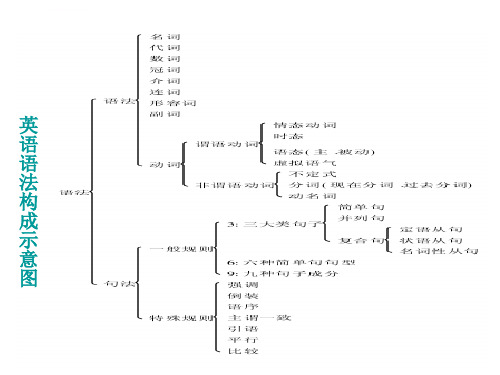
篮球比赛是根据运动队在规定的比赛 时间里 得分多 少来决 定胜负 的,因 此,篮 球比赛 的计时 计分系 统是一 种得分 类型的 系统
1.1 虚拟语气的类别
• 从虚拟语气的形式和内容两方面着眼,可 将其分为三大类:
• be型虚拟语气 • Were型虚拟语气 • 条件虚拟语气
篮球比赛是根据运动队在规定的比赛 时间里 得分多 少来决 定胜负 的,因 此,篮 球比赛 的计时 计分系 统是一 种得分 类型的 系统
place? • 你怎么敢象是这地方的主人似的随意进来? • I would rather we had dinner now. • 我倒愿意现在就吃饭。
篮球比赛是根据运动队在规定的比赛 时间里 得分多 少来决 定胜负 的,因 此,篮 球比赛 的计时 计分系 统是一 种得分 类型的 系统
篮球比赛是根据运动队在规定的比赛 时间里 得分多 少来决 定胜负 的,因 此,篮 球比赛 的计时 计分系 统是一 种得分 类型的 系统
• Please sit down! • I am a teacher./I am not a teacher./Are you
a teacher? • If I were you, I would do better.
• 简单的简单句
• 六个最基本句型,以及其中包含的六种句子成分(主 谓宾系表补)。
• ①SV(主谓) • ②SVO(主谓宾) • ③SVP(主系表) • ④SVOOC(主谓宾宾补) • ⑤SVIODO(主谓双宾语) • ⑥There be + O (There be)
篮球比赛是根据运动队在规定的比赛 时间里 得分多 少来决 定胜负 的,因 此,篮 球比赛 的计时 计分系 统是一 种得分 类型的 系统
高中英语人教版-语法虚拟语气--精编版 课件
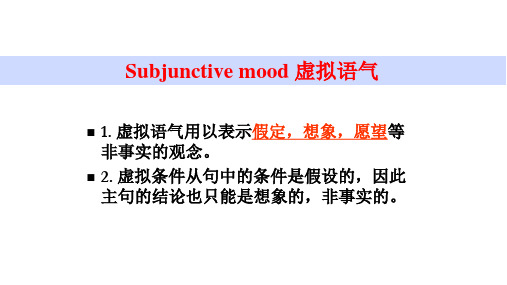
Subjunctive mood 虚拟语气
1. 虚拟语气用以表示假定,想象,愿望等 非事实的观念。
2. 虚拟条件从句中的条件是假设的,因此 主句的结论也只能是想象的,非事实的。
虚拟语气的使用场合
01 用于if 引导的非真实条件句 02 名词性从句中的虚拟语气 03 其他情况
与现在事实相反 与过去事实相反 与将来事实相反 条件句的省略与倒装
= But for your help… = Without your help…
如果虚拟条件句的谓语部分有were, had和should时, 可省略if, 把were, had和should放到从句主语前面去,
多见于面语。 ★要是没有你的帮助,我就失败了。
Had you not helped me, I should have failed.
我发现我拥有很多不同的天赋和技能,如果不是因为我对 尝试新机会的开放心态,我永远都不会想到我会拥有这些 天赋和技能。
★ 假如你处在我的地位,你也会这样干的。 Were you in my position, you would do the same.
★ 假如他们进攻我们,我们就把他们彻底 消灭干净。 Should they attack us, we’ll wipe them out completely.
★ 他们就像朋友一样交谈。 They talked as if they were friends for years. ★她看起来好像年轻了十岁。 She looks as if she were ten years younger. ★ 她看起来似乎是冰做的。 She looked as if she were made of ice.
2.2 虚拟语气在名词性从句中的用法(would rather that)
1. 虚拟语气用以表示假定,想象,愿望等 非事实的观念。
2. 虚拟条件从句中的条件是假设的,因此 主句的结论也只能是想象的,非事实的。
虚拟语气的使用场合
01 用于if 引导的非真实条件句 02 名词性从句中的虚拟语气 03 其他情况
与现在事实相反 与过去事实相反 与将来事实相反 条件句的省略与倒装
= But for your help… = Without your help…
如果虚拟条件句的谓语部分有were, had和should时, 可省略if, 把were, had和should放到从句主语前面去,
多见于面语。 ★要是没有你的帮助,我就失败了。
Had you not helped me, I should have failed.
我发现我拥有很多不同的天赋和技能,如果不是因为我对 尝试新机会的开放心态,我永远都不会想到我会拥有这些 天赋和技能。
★ 假如你处在我的地位,你也会这样干的。 Were you in my position, you would do the same.
★ 假如他们进攻我们,我们就把他们彻底 消灭干净。 Should they attack us, we’ll wipe them out completely.
★ 他们就像朋友一样交谈。 They talked as if they were friends for years. ★她看起来好像年轻了十岁。 She looks as if she were ten years younger. ★ 她看起来似乎是冰做的。 She looked as if she were made of ice.
2.2 虚拟语气在名词性从句中的用法(would rather that)
虚拟语气公开课全PPT课件

虚拟语气公开课全PPT课件
汇报人:
2023-12-22
目
CONTENCT
录
• 虚拟语气基本概念与分类 • 现在虚拟语气详解 • 过去虚拟语气详解 • 未来虚拟语气详解 • 混合时间虚拟语气详解 • 特殊句型中虚拟语气应用 • 总结回顾与拓展延伸
01
虚拟语气基本概念与分类
定义及作用
虚拟语气定义
虚拟语气是一种特殊的动词形式,用于表示与实际情况相反或不 太可能实现的假设、愿望、建议等。
注意事项和误区提示
注意区分虚拟语气和陈 述语气的使用场景,避 免混淆。
在使用虚拟语气时,要 确保主句和从句的时态 和语气保持一致。
注意虚拟语气中动词的 变化和省略形式的使用 。
避免在不需要使用虚拟 语气的场合误用虚拟语 气,导致表达不清或语 法错误。
03
过去虚拟语气详解
结构形式
基本结构
If + 主语 + had + 过去分词,主语 + would/should/could/might + have + 过去分词
省略形式
在特定的上下文或情景中,有时可省略从句中的主语和be动词,只保留were, had, should等词。
使用场景举例
条件状语从句
表示与现在事实相反的情况或假设,如“If I were you, I would accept the offer.”(如 果我是你,我会接受这个提议。)
宾语从句
省略形式
Had + 主语 + 过去分词,主语 + would/should/could/might + have + 过去分词
倒装形式
Had + 主语 + 过去分词,倒装部分(即把if省略, 把were, had, should提到句首)
汇报人:
2023-12-22
目
CONTENCT
录
• 虚拟语气基本概念与分类 • 现在虚拟语气详解 • 过去虚拟语气详解 • 未来虚拟语气详解 • 混合时间虚拟语气详解 • 特殊句型中虚拟语气应用 • 总结回顾与拓展延伸
01
虚拟语气基本概念与分类
定义及作用
虚拟语气定义
虚拟语气是一种特殊的动词形式,用于表示与实际情况相反或不 太可能实现的假设、愿望、建议等。
注意事项和误区提示
注意区分虚拟语气和陈 述语气的使用场景,避 免混淆。
在使用虚拟语气时,要 确保主句和从句的时态 和语气保持一致。
注意虚拟语气中动词的 变化和省略形式的使用 。
避免在不需要使用虚拟 语气的场合误用虚拟语 气,导致表达不清或语 法错误。
03
过去虚拟语气详解
结构形式
基本结构
If + 主语 + had + 过去分词,主语 + would/should/could/might + have + 过去分词
省略形式
在特定的上下文或情景中,有时可省略从句中的主语和be动词,只保留were, had, should等词。
使用场景举例
条件状语从句
表示与现在事实相反的情况或假设,如“If I were you, I would accept the offer.”(如 果我是你,我会接受这个提议。)
宾语从句
省略形式
Had + 主语 + 过去分词,主语 + would/should/could/might + have + 过去分词
倒装形式
Had + 主语 + 过去分词,倒装部分(即把if省略, 把were, had, should提到句首)
高中英语语法——虚拟语气(28张PPT)

6. Jean doesn’t want to work right away
because she thinks that if __w_e_r_e_t_o_g_e_t_ _/_s_h_o_u_l_d_g_e_t_/g_o_t___(get) a job, she
probably wouldn’t be able to see her friends very often.
我们用虚拟语气陈述现在不真实或想象的情景。
1) If I got married in UK, I would expect a present.
2) I could reach the book if I were a bit taller. 3) If I had the chance, I might want to be a translator.
We form unreal present conditionals like this:
If… was/were/did … , …would/could/might do …
Practice: 1. 假如现在我有更多的时间,我就会学习德语。 If I had more time now,I would study German. 2. 要是我象你一样年轻,我就会找时间锻炼。 If I were/was young as you, I would find time to exercise.
2) In written English or in formal situation, we usually use were in If-clauses in place of was. However, in everyday conversation, was is often used.
because she thinks that if __w_e_r_e_t_o_g_e_t_ _/_s_h_o_u_l_d_g_e_t_/g_o_t___(get) a job, she
probably wouldn’t be able to see her friends very often.
我们用虚拟语气陈述现在不真实或想象的情景。
1) If I got married in UK, I would expect a present.
2) I could reach the book if I were a bit taller. 3) If I had the chance, I might want to be a translator.
We form unreal present conditionals like this:
If… was/were/did … , …would/could/might do …
Practice: 1. 假如现在我有更多的时间,我就会学习德语。 If I had more time now,I would study German. 2. 要是我象你一样年轻,我就会找时间锻炼。 If I were/was young as you, I would find time to exercise.
2) In written English or in formal situation, we usually use were in If-clauses in place of was. However, in everyday conversation, was is often used.
虚拟语气ppt课件完整版
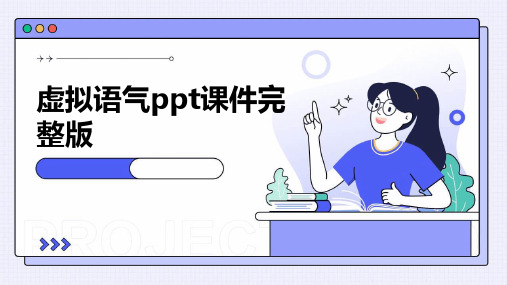
02 03
例子
Had you come earlier, you would have met him.(= If you had come earlier, you would have met him.)(如果你早点来,你就能 见到他了。)
例子
Should it rain tomorrow, we would stay at home.(= If it should rain tomorrow, we would stay at home.)(如果明天下雨,我们就 呆在家里。)
虚拟语气用于强调句时,通常是通过 “It was ... that”结构对句子中的特 定成分进行强调。
在这种结构中,虚拟语气的使用与普 通虚拟语气略有不同,需要根据具体 情况进行判断。
虚拟语气与其他语法结构搭配使用
虚拟语气可以与定语从句、状语从句等语法结构搭配使用,表达更为复杂的语义关 系。
在这些结构中,虚拟语气的使用需要根据具体的语境和表达的语义关系进行判断。
真实条件句
表达现实中可能实现的情况, 使用陈述语气。
例子
If you study hard, you will pass the exam.(如果你努力 学习,你会通过考试。)
非真实条件句
表达与事实相反或不太可能实 现的情况,使用虚拟语气。
例子
If I were you, I would not do that.(如果我是你,我不会那
状语从句中虚拟语气使用
在if条件状语从句中
如果条件状语从句所表示的内容与实际情况相反或实现的可能性很小,则从句中的谓语动词常用虚拟语气。
在其他状语从句中
除了if条件状语从句外,还有一些其他状语从句也可以用虚拟语气,如:in order that(为了)、so that(以便 )等引导的目的状语从句中。这些从句中的谓语动词形式通常为“may/might/could/should + 动词原形”。
高中英语语法--虚拟语气课件(54张)
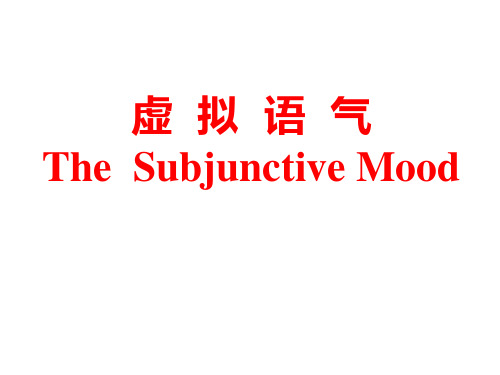
have grown still better. • 如果你早就给庄稼多浇些水,他们就会长得更好 • (表示对过去的虚拟)
错综时间条件句
• If he had prepared well for his lessons yesterday, he wouldn’t have so many difficulties now.
二、 祈使语气
用来表示说话人的请求,命令或劝告等。 动词要用原形,其否定式在动词前加do not.
Let me have a try. Don’t be late again. Don’t say it in Chinese. Say it in English. Let’s go and play basketball.
三、 虚拟语气
• 表示说话人所说的话不是事实,而 是一种与事实相反的假设,愿望, 猜测或建议等等。
三、 虚拟语气
• (一)在条件句中的 用法
• 1 与现在事实相反
从句谓语 主句谓语
动词过去 Should/wo 式 uld/ could /might +动词原形
与现在事实相反
• If I had time now, we should read it again.
If I hadn’t been busy,
补充2.错综时间条件句
• 主句谓语动词所表示的动作和条件 从句谓语动词所表示的动作并不是 同时发生,这时动词的形式并不完 全按照上述表格形式进行,而需要 按照各自的时间来调整,这样的句 子就叫错综时间条件句.
错综时间条件句
• If you had followed the doctor’s advice (then), you would be all right now.
错综时间条件句
• If he had prepared well for his lessons yesterday, he wouldn’t have so many difficulties now.
二、 祈使语气
用来表示说话人的请求,命令或劝告等。 动词要用原形,其否定式在动词前加do not.
Let me have a try. Don’t be late again. Don’t say it in Chinese. Say it in English. Let’s go and play basketball.
三、 虚拟语气
• 表示说话人所说的话不是事实,而 是一种与事实相反的假设,愿望, 猜测或建议等等。
三、 虚拟语气
• (一)在条件句中的 用法
• 1 与现在事实相反
从句谓语 主句谓语
动词过去 Should/wo 式 uld/ could /might +动词原形
与现在事实相反
• If I had time now, we should read it again.
If I hadn’t been busy,
补充2.错综时间条件句
• 主句谓语动词所表示的动作和条件 从句谓语动词所表示的动作并不是 同时发生,这时动词的形式并不完 全按照上述表格形式进行,而需要 按照各自的时间来调整,这样的句 子就叫错综时间条件句.
错综时间条件句
• If you had followed the doctor’s advice (then), you would be all right now.
高中英语虚拟语气课件课件(共71张ppt)
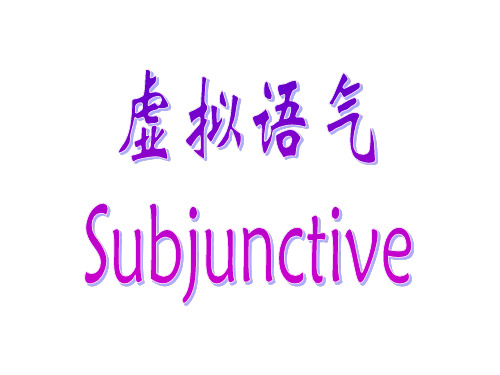
• A. will allow
B. should allow
• C. would have allowed D. had allowed
3.If we had known that she had planned to go abroad today, we ____ at the airport.
过去式(did) be were
①did / were ②should +do ③were to do
would should could might
+have done sth
would should could might
+ do sth
would should + do sth could might
如果他当时用功学习的话,他可能就得到奖学 了。
if he H__a_d_s_t_u_d_i_e_d(study) hard, he _c_o_u_ld__h_a_v_e__w_i_n_(win) the scholarship. 如果昨天他见到你,他就可能问你这个问题。
If he h_a_d__s_ee_n_(see) you yesterday, he _W__o_u_ld__h_a_v_e__a_sk_e_d__(ask) you about it.
不是一个事实,而是一种假设、猜 测、怀疑、愿望、要求、命令、建 议等 。
• I have a car. • 我有一部车。(指现在有)
• I had a car. • 我有一部车。(指过去有)
• I wish I had a car. • 但愿我有一部车。(实际没有,表
愿望)
一、if 条件句中的虚拟语气
虚拟语气的构成及其用法ppt课件.pptx

if虚拟条件句 表示条件是假设的或几乎无法实现的, 谓语动词 用虚拟语气。
①与现在事实相反
②与过去事实相反
③与将来事实可能相反
与现在事实相反
If I had a great deal of money, I would buy a villa (别墅) for my parents.
与现在事实相反
The old woman’s demand is that her son (should) come to see her once a week. 那位老妇人的要求是她的儿子每周来看她一次。
We are in favor of the advice that the factory (should) be closed
down.
我们赞成关闭工厂的建议。
wish
与现在事实相反: 一般过去时( be 用were ) 与过去事实相反: 过去完成时 与将来事实相反: would/could +V.原
should
I wish I _w_e_r_e_ (be) as tall as Yao Ming.
I wish/wished I __h_a_d_n_’t(have not) eaten so much watermelon.
the future .
A had visited B would visit
C visited
D will visit
I’d rather you _D___ me the
news. A. not tell B. not to tell C. didn’t tell D. hadn’t told
I wish it _w_o__u_ld_ ( will ) rain tomorrow. If so, I can stay at home to have a good sleep.
高中英语——虚拟语气(69张PPT)
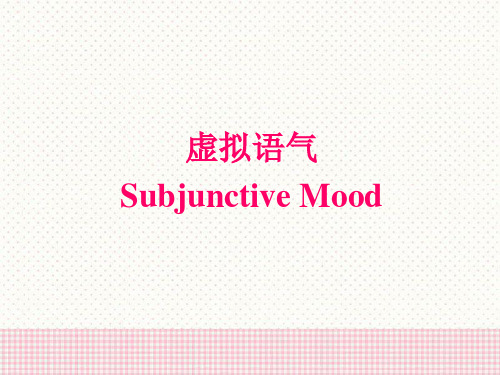
insist/suggest不接虚拟的用法
(c)与将来事实相反
从句的谓语用If I (we, you, he, they) + 动词过去式或 were to do 或should do 形式, 主句谓语用should(第一人称) /would (第二、三人称) /could/ might + 动词原形。
If the god should give/ were to give/ gave me a chance, I would tell that girl that I love her.
If he got up early, he would be on time.
PRACTICE 3: Fill in the blanks
a. If there s_h_o_u_l_d__b_e (be) no natural resource any more, we s_h_o_u_l_d__m_a_k_e_ (make) use of nuclear power.
•
12、要记住,你不仅是教课的教师,也是学生的教育者,生活的导师和道德的引路人。02:28:3902:28:3902:28Saturday, August 28, 2021
13、He who seize the right moment, is the right man.谁把握机遇,谁就心想事成。21.8.2821.8.2802:28:3902:28:39August 28, 2021
(3) 表示对将来的主观愿望: 从句动词形 式为 “ would+动词原形”。
注意: 主句的主语与从句的主语不能相 同, 因为主句的主语所期望的从句动作 能否实现,取决于从句主语的态度或意 愿(非动物名词除外)。 但愿你立刻来。
虚拟语气最新PPT课件
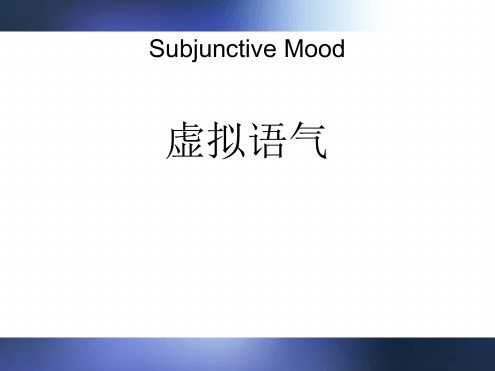
如果他现在在这里,一切都好了。 If you worked hard ,you would pass the examination.
要是你用功,你会通过考试的。
2. 与过去事实相反的假设。 例如:
If her mother had taken the doctor ' s advice, she would /might have got well earlier . 如果她 母亲当时遵照医嘱,她本来/可能会早点康复的。
二、含蓄条件句
1. 有时假设的情况并不以条件从句表示出来,而 是通过一个介词短语 短语表示。 例如:
But for the storm, we should have arrived much earlier .要不是暴风雨,我们也许早就到了。
She would leave her husband except for the child. 要不是因为这孩子 , 她现在就离开了她的丈夫。
1. 与现在事实相反的假设。 例如:
If l weren't dressed in this uniform ,I wouldn ' t feel so conspicuous. 如果我现在要是不穿这件制服,我就不感到这样 惹人注目。 If he were here ,everything would be all right.
It is recommended that the project not be started until all the preparations have been made. 有人建议这项工程直到一切准备就绪后才开始。
It is of the utmost importance that you( shouId ) be here on time 你按时来这里是极其重要的。
要是你用功,你会通过考试的。
2. 与过去事实相反的假设。 例如:
If her mother had taken the doctor ' s advice, she would /might have got well earlier . 如果她 母亲当时遵照医嘱,她本来/可能会早点康复的。
二、含蓄条件句
1. 有时假设的情况并不以条件从句表示出来,而 是通过一个介词短语 短语表示。 例如:
But for the storm, we should have arrived much earlier .要不是暴风雨,我们也许早就到了。
She would leave her husband except for the child. 要不是因为这孩子 , 她现在就离开了她的丈夫。
1. 与现在事实相反的假设。 例如:
If l weren't dressed in this uniform ,I wouldn ' t feel so conspicuous. 如果我现在要是不穿这件制服,我就不感到这样 惹人注目。 If he were here ,everything would be all right.
It is recommended that the project not be started until all the preparations have been made. 有人建议这项工程直到一切准备就绪后才开始。
It is of the utmost importance that you( shouId ) be here on time 你按时来这里是极其重要的。
- 1、下载文档前请自行甄别文档内容的完整性,平台不提供额外的编辑、内容补充、找答案等附加服务。
- 2、"仅部分预览"的文档,不可在线预览部分如存在完整性等问题,可反馈申请退款(可完整预览的文档不适用该条件!)。
- 3、如文档侵犯您的权益,请联系客服反馈,我们会尽快为您处理(人工客服工作时间:9:00-18:30)。
十 几种特殊情况 1. 错综时间条件句
1.If you had listened to me, you wouldn’t be in such trouble now. 2.If the doctor had come in time, Amy would still be alive. 3.If he had received six more votes, he would be our chairman now.
与过去事实相反,宾语从句的谓语动词用过去完 成时。
(2) * suggest等 + 宾语从句。这类动词有:order, insist, demand, desire, command, propose, request等。
1)The teacher suggested that our sports meeting (should) be put off till next week.
条件句表示主句的条件,分真实条
件句 和虚拟条件句 两种。
a. 真实条件句 表示条件是真的或有可 能实现的, 采用陈述语气。 b. 虚拟条件句 表示条件是无法实现或 几乎无法实现的, 采用虚拟语气。
2016/8/9
一、用法归纳: 虚拟语气在条件状语从句中的用法
主从 虚拟条件 成 句 从句(if …) 时态 与现 在事实 相反的 假设 构
I would rather you finished the work tomorrow.
I’d rather you had finished the work yesterday. 在would rather句型中,与过去事实相反,从句 的谓语动词用过去完成时;与现在、将来事实相 反,从句的谓语动词用过去时。
记住:insist / suggest 各有两种意思,要用不同的语气 Insist 表示“坚决要求”时,用虚拟形式,即 should do; Insist 表示“坚称,坚持说”时,用陈述语气,表示事 实。 Suggest 表示“建议”时,用虚拟形式。
注意:insist, suggest后接的宾语从句不用虚拟语 气的情况。 1)she insisted that she was right. 当insist的意思是坚持某人自己的观点时,后接的 宾语从句不能用虚拟语气。
2) The look on his face suggested that he was unhappy.
当suggest的意思是暗示、表明时,后接的宾语从 句不能用虚拟语气。
1)My suggestion is that you (should) visit the farm. 2) His idea is that the students (should) make a plan. (3)* 句中有suggestion, plan, idea, order, requirement, motion, recommendation, proposal等名词,其后的表语从句或同位语从句 中的谓语动词用(should) + 动词原形。
虚拟语气用于表语从句,同位语从句中。
名词advice, order, demand, proposal, command, requirement, insistence, suggestion, request等的表语从句和同位语从句要用虚拟语气, 其谓语动词的构成是(should) +动词原形 We all agreed to his suggestion that we (should) go to Beijing for our summer vocation.
1)She talked about America as if he had been born there. 2) He sings as though he were a singer. 八、由as if或as though引导的状语从句,其谓语 动词用过去式或had + 动词的过去分词。
A an Italian. 1) He appears as though he ____ A. were B. was C. has been D. be D there yesterday. 2) It seems as if he ____ A. was B. were C. has been D. had been
Had I had time, I would have gone to see the film. =If I had had time, I would have gone to see the film. 五 在虚拟语气的条件从句中,可以省略if ,但要 把状语从句变成一般疑问句语序。 ____ C today, he would get there on Friday. A.Was he leaving C. Were he to leave B. If he leaves D. If he is leaving
2. It’s time that we had(或should have) a class. 在It’s about/high time that句型中,从句的谓语 动词用过去时或should do sth. 3.I would rather you finished the work today.
主 句 主语 + would/ should/ could/ might do
与将 来情况 相反的 假设
①If + 主语 + did ② If + 主语 +were to do ③ If + 主语 + should do
二 虚拟语气在条件从句中的应用
1)与现在事实相反 过去时 从句谓语: would, should, could, might +动词原 主句谓语: 形 If I had a lot of money I would buy a villa. If I were you, I would go there. 注意:在虚拟语气中,只能用were,不能用was.
七 有时虚拟条件从句与主句的时间不一致, 出现混合虚拟语气结构。
1)If he had followed the doctor’s advice, he would be well. 2) If I were you I would not have gone to see the film yesterday. 在混合虚拟语气结构中,从句表示的动作与主句 表示的动作的时间不一致,这时主、从句谓语动 词的形式要根据它们发生的时间进行调整。
在 command, order , require ,demand, request, insist, propose, suggest等动词 后面的宾语从句,要用虚拟语气,其谓语动词用 (should) +动词原形
We suggest that we (should) have a meeting. We insisted that they (should) go with us.
十一 If 可能被省略,从句要倒装
1.Were she in charge (= If she were in charge) , she would do things differently. 2.Had I known your address (= If I had known your address) , I would have written before. 3.Should you change your mind (= If you should change your mind), no one would blame you.
六 有时虚拟语气的条件从句不用if引导,而用but for, without, if only, otherwise等词。 1) But for your help, I couldn’t have made such great progress in English. 2) Without air, we couldn’t live. 以but for, without开头的句子,谓语动词的形式 和if的主句的一致。 3) If only the weather were fine. 以If only开头的句子,谓语动词的形式和if从句的 一致。 4) I had been there by taxi, otherwise I would have missed the train. 主、从句的谓语动词的形式都和if从句相一致。
四 与过去事实相反
从句谓语: had + 动词的过去分词
主句谓语:
would, should, could, might + have + 动词的过去分词
If he had come earlier, he would have seen her. If he had driven more carefully, he would not have had the car accident yesterday
九、虚拟语气在宾语从句中的应用
(1)* wish + 宾语从句 1)I wish I were a doctor. 与现在事实相反,宾语从句的谓语动词用过去时。 2) I wish I should go abroad next year. 与将来事实相反,宾语从句的谓语动词用should, would, could, might + 动词原形。 3) I wish I had seen the football match.
(4)* 记住下面几个句型: 1. natural/important/necessary/impossible
surprising/strange/funny/essential
It is + that requested/suggested/desired/proposed a pity/a matter of regret/a shame/no wonder 从句的谓语动词用(should) + 动词原形
